
2018年,6月22日,“CCF走进高校”活动来到上海理工大学。活动邀请了华中科技大学计算机学院副院长廖小飞教授的代表刘海坤副教授和清华大学电子工程系长聘副教授汪玉博士,分别作了“异构内存计算系统的构造:进展与问题”和“Towards Efficient Deep Learning Processing on FPGA/Edge”的专题学术报告。会议由上海市浦江学者、计算机科学与工程系副教授裴颂文主持。
In 2018, on June 22, the ' CCF went to college' event came to the University of Shanghai for Science and Technology. The event has invited Professor Liu Haikun, Associate Dean of the School of Computer Science, Huazhong University of Science and Technology, and Associate Professor Wang Yu, Associate Professor of Electronic Engineering, Tsinghua University. They gave the speeches on 'The Structure of Heterogeneous Memory Computing Systems: Progress and Problems' and 'Towards Efficient Deep Learning Processing on FPGA/Edge' respectively. The meeting was hosted by SongWen Pei, an associate professor of Shanghai Pujiang Scholars and Department of Computer Science and Engineering.
报告会上,刘海坤介绍了内存计算的关键技术、新型内存计算面临的一系列技术挑战:系统架构、操作系统、编程模型、数据管理和硬件设备等。并深入介绍了华中科技大学在内存计算领域的最新研究成果:混合内存系统模拟器及仿真器、可重构混合内存架构、缓存替换策略、堆叠DRAM的缓存管理等,最后展望了存算一体的发展方向。
At the report, professor Liu introduced the key technologies of memory computing and a series of technical challenges faced by new memory computing: system architecture, operating system, programming model, data management and hardware equipment. It also introduces the latest research results of Huazhong University of Science and Technology in the field of memory computing: hybrid memory system simulator and simulator, reconfigurable hybrid memory architecture, cache replacement strategy, cache management of stacked DRAM, etc. Direction of development.
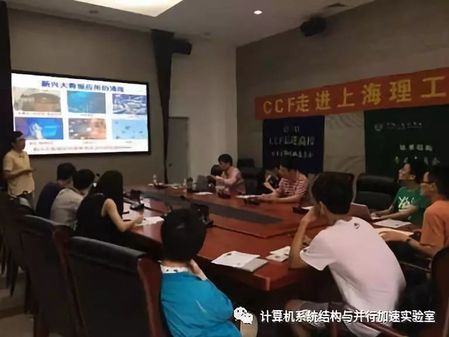
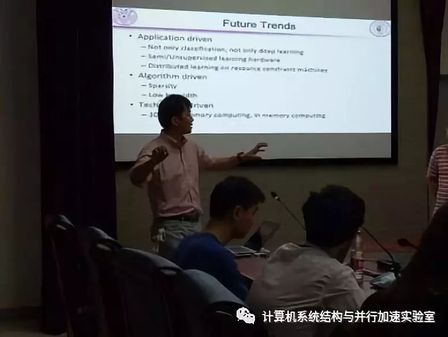
汪玉从他对智能芯片和加速计算的理解谈起,介绍了他在深度学习硬件加速方面的相关工作。介绍了深度学习面临的困难和解决方案,包括提高计算平台的并行性、增加读写内存的效率以及如何提高稀疏矩阵的计算能力。展示了其用FPGA实现语音和视频流压缩方面的成果。
Professor Wang talked about his understanding of smart chips and accelerated computing, and introduced his work on deep learning hardware acceleration. And he introduces the difficulties and solutions for deep learning, including improving the parallelism of computing platforms, increasing the efficiency of reading and writing memory, and how to improve the computing power of sparse matrices. And he also demonstrated their's achievements in implementing voice and video stream compression with FPGAs.
在互动环节,上海理工大学光电信息与计算机工程学院的师生积极与刘海坤和汪玉交流互动。讲者对同学们善于思考和高质量的提问大加赞赏,并对同学们的提问做了耐心的解答,同学们受益匪浅。报告会在参会人员的热烈掌声中圆满结束。
In the interactive session, teachers and students of the School of Optoelectronic Information and Computer Engineering of Shanghai University of Technology and Science actively interacted with Liu Haikun and Wang Yu. The speakers greatly appreciated the students' good thinking and high-quality questions, and patiently answered the questions of the students. The students benefited a lot. The report will be successfully concluded with the warm applause of the participants.
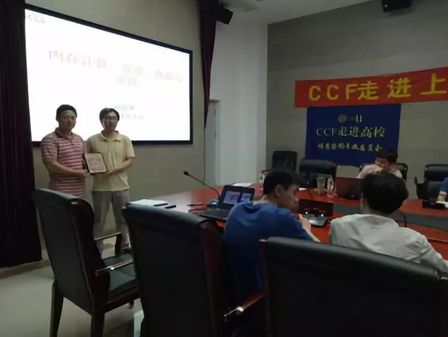
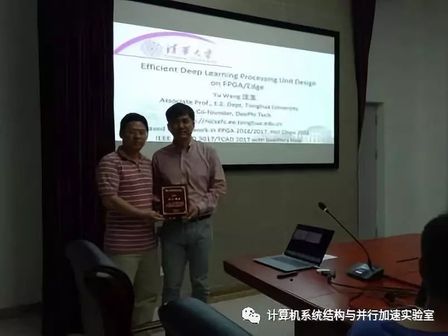
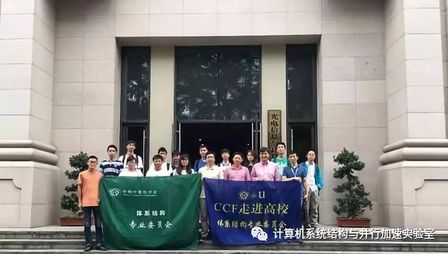
学生感想:
The impressions of Students:
(计算机技术专业2016级研究生姬燕飞)汪玉老师由浅入深讲解了深度学习存在的能耗问题,基于FPGA设计加速器加速神经网络,打造深度学习芯片与平台。首先,汪玉老师讲解了自己想做一件什么事,为什么想做这件事,以及怎样把这件事做到极致,非常注重个人思考,想清楚了就去做,方向是一个关键问题。听了两位老师的讲解,受益匪浅,希望未来中国在芯片领域能有自己的模拟器,自己的芯片,将“中国芯”推向世界!
(YanFei Ji)Professor Wang Yu explained the energy consumption problem of deep learning from the shallower to the deeper. Based on the FPGA design accelerator, the neural network was accelerated to build a deep learning chip and platform. First of all, Teacher Wang Yu explained what he wanted to do, why he wanted to do it, and how to do it to the extreme. He paid great attention to personal thinking. If you want to know clearly, the direction is a key issue. After listening to the explanations of the two teachers, I hope that China will have its own simulator in the chip field, and its own chip will push the China Core to the world!
(计算机系统结构专业2017级研究生袁济宏)今日上午,我有幸参加了CCF走进高校为我们带来的两个报告讲座,听完以后受益匪浅。刘海坤教授详细讲解了有关异构内存的一些结构,并对其进行详细分析,以及他的一些研究成果,如HME、MALRU等。对此我感触颇深,让我对异构类型的内存系统有了更深一步、更前沿的认识。汪玉教授深入浅出地分析了在FPGA平台上面向深度学习加速器,描述了所打造的最先进的深度学习芯片与平台。不仅仅在技术上开拓了我们的眼界,更让我了解了如何在学术研究上有逻辑地展开学术性思维。非常感谢CCF走进高校,这次讲座让我收获颇丰,对我未来学术道路带来许多启迪。
(JiHong Yuan)At this morning, I was fortunate enough to participate in the two report lectures that CCF brought to college and brought us. After listening to it, I benefited a lot. Professor Liu Haikun explained in detail some structures about heterogeneous memory, and detailed analysis of it, as well as some of his research results, such as HME, MALRU and so on. I am deeply touched by this, let me have a deeper and more cutting-edge understanding of heterogeneous types of memory systems. Wang Yu analyzed the deep learning accelerator on the FPGA platform and described the most advanced deep learning chips and platforms. Not only has our vision been opened up in technology, but it has also taught me how to logically develop academic thinking in academic research. I am very grateful to CCF for coming into college. This lecture has given me a lot of experience and brought a lot of enlightenment to my future academic path.
(计算机技术专业2017级研究生沈天马)汪玉教授介绍了自己科研工作的3个五年计划和他在深度学习硬件加速方面的相关工作。在能耗问题上,汪教授强调了0-1反转的消耗和数据迁移的消耗,也是自己加速算法的着手点。在实验部分,汪教授展示了自己加速硬件的巨大成功。在性能和占有率上,自己设计的硬件性能近似于英伟达Titan V(最新GPU高性能显卡)
(TianMa Shen)Professor Wang Yu introduced three five-year plans for his own research work and his work on deep learning hardware acceleration. On the issue of energy consumption, Professor Wang emphasized the consumption of 0-1 inversion and the consumption of data migration, and it is also the starting point of its own acceleration algorithm. In the experimental part, Professor Wang showed his great success in accelerating hardware. In terms of performance and occupancy, the hardware performance of the design is similar to the NVIDIA Titan V (the latest GPU high-performance graphics card).
(计算机科学与技术专业2016级本科生罗厚赞)汪老师的演讲内容确实让我开了一波脑洞。关于AI芯片,我也是最近才开始关注,因为我在我的电脑跑一个目标检测算法用GPU还觉得很慢。但我们最终目标是应用到手机上,汪老师和他的团队已经做到了,非常佩服他。现在人工智能芯片的研制才刚开始起步,我们需要具有运算能力强、功耗低的芯片。汪老师专门研究这一领域来解决深度学习落地的痛点。希望以后能取得更好的成就,为中国的芯片产业做出更大的贡献。
(HouZan Luo)Teacher Wang's presentations opened my brain wave hole. Regarding the AI chip, I started to pay attention recently, because I am running a target detection algorithm with a very slow speed on my computer with the GPU. But our ultimate goal is to apply to the mobile phone. Teacher Wang and his team have already done it, and I admire him very much. At present,the development of artificial intelligence chips is just beginning, we deeply need chips with strong computing power and low power consumption. Teacher Wang specializes in this field to solve the pain points of deep learning. I hope that Teacher Wang will achieve better achievements in the future and make greater contributions to the Chinese chip industry.

